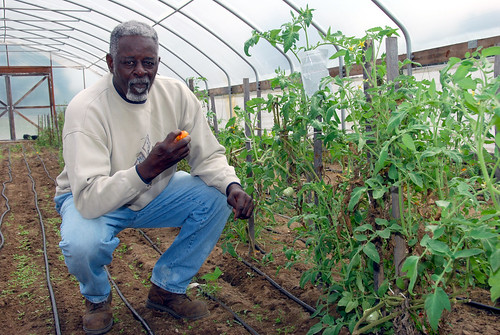
David Backus is reminded of the benefits of the seasonal high tunnel on his property in southeastern Missouri at nearly every meal – and sometimes between meals.
“The food that I grow in my own garden is healthier than the food I can buy at the store, and it tastes so much better,” said Backus between bites of a just picked tomato.
Backus and his wife Ella installed a seasonal high tunnel at their home in Morley through a program offered by the USDA’s Natural Resources Conservation Service, (NRCS). The Environmental Quality Incentives Program, (EQIP), provided about 90 percent of the cost of the structure.
A seasonal high tunnel looks like a greenhouse, but instead of raising plants on tables, gardeners and farmers plant vegetables in the ground. The main benefit of a high tunnel is that it extends the growing season because of warmer air temperatures inside. Backus said his high tunnel also keeps out bugs that often destroy his outdoor plants. His high tunnel is also equipped with a well and micro irrigation system.
“Basically, it gives me two growing seasons,” Backus said.
He learned about seasonal high tunnels at a field day at Lincoln University in Jefferson City. That led him to his local NRCS office, where he applied for financial assistance through EQIP which paid part of the cost of installing his high tunnel and irrigation system. NRCS also has been providing Backus with technical assistance to make his operation more successful, including initiating practices that will improve the health of the soil inside the high tunnel and in his outside gardens.
“I need to slowly build that soil up because it is so sandy,” he said. “It will take time, but once I do, I will be able to grow more and better vegetables.”
David Speidel, NRCS resource conservationist, said the keys to doing that are to use cover crops and to avoid tilling. Backus said he built his high tunnel with doors large enough to get his tractor inside, but he now knows that tilling the ground does more harm than good.
“I’m moving into no-tillage in the high tunnel,” he said.
Not content to just enjoy the benefits of his high tunnel himself, Backus has been speaking at seminars in the area. He said he wants to spread the message about the benefits of locally grown food.
